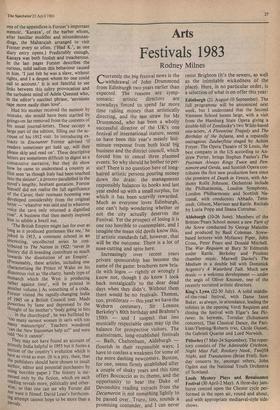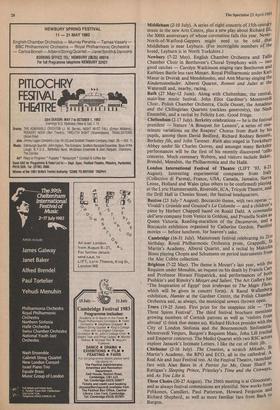Arts
Festivals 1983
Rodney Milnes
Currently the big festival news is the withdrawal of John Drummond from Edinburgh two years earlier than expected. The reasons are symp- tomatic: artistic directors are nowadays forced to spend far more time raising money than artistically directing, and the last straw for Mr Drummond, who has been a wholly successful director of the UK's one festival of international stature, seems to have been this year's measly last- minute response from both local big business and the district council, which forced him to cancel three planned events. So why should he bother to per- sist? There is no question here of long- haired artistic persons pouring money down the drain: the management responsibly balances its books and last year ended up with a small surplus, for which it has been scurvily rewarded. Much as everyone loves Edinburgh, one can't help wondering whether or not the city actually deserves the Festival. Yet the prospect of losing it is one too horrible to contemplate, and I imagine the mean old devils know this. If artistic standards fall, however, that will be the outcome. There is a lot of nose-cutting and spite here.
Increasingly over recent years private sponsorship has become the name of the game: brochures now bris- tle with logos — rightly or wrongly I know not, though I do know I look back nostalgically to the dear dead days when they didn't. Without them there would be no festivals. Themes, too, proliferate — this year we have the Webern centenary, Sir Lennox Berkeley's 80th birthday and Brahms's 150th — and I suspect that less musically respectable ones may tip the balance for prospective visitors. The mainstream, long-established festivals — Bath, Cheltenham, Aldeburgh flourish in their responsible ways; I have to confess a weakness for some of the more dashing newcomers. Buxton, for one, seems firmly established after a couple of shaky years and this time offers Boccaccio as its theme, and the opportunity to hear the Duke of Devonshire reading extracts from the Decameron is not something lightly to be passed over. Truro, too, sounds a promising contender, and I can never resist Brighton (it's the sewers, as well as the inimitable wickedness of the place). Here, in no particular order, is a selection of what is on offer this year: Edinburgh (21 August-10 September). The full programme will be announced next week, but I understand that the Second Viennese School looms large, with a visit from the Hamburg State Opera giving a double-bill of Zemlinsky's two Wilde-based one-acters, A Florentine Tragedy and The Birthday of the Infanta, and a reputedly outrageous ZauberflOte staged by Achim Freyer. The Opera Theatre of St Louis, the best company in the US according to An- drew Porter, brings Stephen Paulus's The Postman Always Rings Twice and Fen- nimore and Gerda, and Scottish Opera con- tributes the first new production here since the premiere of Death in Venice, with An- thony Rolfe Johnson. Orchestras include the Philharmonia, London Symphony, London Philharmonic and Scottish Na- tional, with conductors Abbado, Tenn- stedt, Gibson, Marriner and Rattle. Recitals by Lucia Popp and Ileana Cotrubas.
Aldeburgh (10-26 June). Members of the Britten/Pears School mount a new Turn of the Screw conducted by George Malcolm and produced by Basil Coleman. Screw- based lectures with Myfanwy Piper, John Cross, Peter Pears and Donald Mitchell. The War Requiem at Bury St Edmunds under Rattle. Berkeley and Poulenc chamber music. Maxwell Davies's The Medium in a double bill with Dominick Argento's A Waterbird Talk. Much new music — a welcome development — under the aegis of Oliver Knussen, one of the recently recruited artistic directors.
King's Lynn (22-30 July). A solid middle- of-the-road festival, with Dame Janet Baker, as always, in attendance, leading the soloists in the opening Verdi Requiem and closing the festival with Elgar's Sea Pic- tures. In between, Tortelier (Schumann concerto), Thai Classical Dance, the Pari- kian/Fleming/Roberts trio, Cecile Ousset, the Gabrieli Quartet and Lord Norwich.
Pitlochry (7 May-24 September). The reper- tory consists of The Admirable Crichton, Night Must Fall, Rookery Nook, Twelfth Night, and Translations (Brian Friel). Sun- day concerts by, amongst others, John Ogden and the National Youth Orchestra of Scotland.
Leeds Mystery Plays and Renaissance Festival (30 April-2 May). A three-day jam- boree centred upon the Chester cycle per- formed in the open air, round and about, and with appropriate mediaeval-style side- shows. Middleham (2-10 July). A series of eight concerts of 15th-century music in the new Arts Centre, plus a new play about Richard III, the 300th anniversary of whose coronation falls this year. Never- North-of-Watford-Gappers might need to be told that Middleham is near Leyburn. (For incorrigible members of the breed, Leyburn is in North Yorkshire.) Newbury (7-22 May). English Chamber Orchestra and Tallis Chamber Choir in Beethoven's Choral Symphony with — two good catches — Carolyn Watkinson singing rare Beethoven and Kathleen Battle less rare Mozart. Royal Philharmonic under Kurt Masur in Dvorak and Mendelssohn, and Ann Murray singing the Kindertotenlieder. Alberni Quartet, Romeo and Juliet at the Watermill and, nearby, racing.
Bath (27 May-12 June). Along with Cheltenham, the central, main-line music festival. John Eliot Gardiner's Monteverdi Choir, Polish Chamber Orchestra, Cecile Ousset, the Amadeus and the Chilingirian Quartets (reckless generosity), the Nash Ensemble, and a recital by Felicity Lott. Good fringe. Cheltenham (2-17 July). Berkeley celebrations — he is the festival president — feature 'A Bouquet for Lennox', a series of one- minute variations on the Reapers' Chorus from Ruth by his pupils, among them David Bedford, Richard Rodney Bennett, Berkeley fits, and John Tavener. Ruth also staged in Tewksbury Abbey under Sir Charles Groves, and amongst many Berkeley performances will be the first of his recently discovered 'cello concerto. Much centenary Webern, and visitors include Baker, Brendel, Menuhin, the Philharmonia and the Halle.
London International Festival of Theatre (LIFT '83, 8-21 August). Interesting experimental companies from 'tab' (Collectivo di Parma), France, USA, Canada, Jamaica, Sierra Leone, Holland and Wales (plus others to be confirmed) playing at the Lyric Hammersmith, Riverside, ICA, Tricycle Theatre, and the Drill Hall in Chenies Street, the festival headquarters.
Buxton (23 July-7 August). Boccaccio theme, with two operas —; Vivaldi's Griselda and Gounod's La Colombe --and a children s piece by Herbert Chappell based on Roald Dahl. A commedia dell'arte company from Venice in Goldoni, and Prunella Scales as Queen Victoria. Reading-marathon of the Decameron, and. a. Boccaccio exhibition organised by Catherine Gordon. Pasoltril movies — before luncheon, for heaven's sake.
Cambridge (16-31 July). Mainstream festival celebrating its. 21st birthday. Royal Philharmonic Orchestra prom, Grappelli, St Martin's Academy, Alberni Quartet, and a recital by Malcolm Binns playing Chopin and Schumann on period instruments from the Alec Cobbe collection.
Brighton (7-22 May). The theme is Mozart's last year, with the Requiem under Menuhin, an inquest on his death by Francis Carr and Professor Horace Fitzpatrick, and performances of both Pushkin's and Rimsky's Mozart and Salieri. The Art Gallery has `The Inspiration of Egypt' (not irrelevant to The Magic Flute, which will be given in concert form). A Raoul Wallenberg exhibition, Hamlet at the Gardner Centre, the Polish Chamber Orchestra and, as always, the municipal sewers thrown open. Truro (19-25 June). First prize for the snappiest title — 'The Three Spires Festival'. The third festival brochure mentions growing numbers of Cornish patrons as well as 'visitors from abroad' (I think that means us). Richard Hickox presides with the City of London Sinfonia and the Bournemouth Sinfonietta. Monteverdi Vespers, Burgon's Requiem Mass, John Lill (recital and Emperor concerto). The Medici Quartet with two RSC actors explore Janacek's Intimate Letters. I like the cut of their jib. Chichester (2-16 July). The Creation, a scratch Mikado, St Martin's Academy, the RPO and ECO, all in the cathedral. .A Real Ale and Jazz Festival too. At the Festival Theatre, raunchier fare with Alan Bates in A Patriot for Me, Omar Sharif in Rattigan's Sleeping Prince, Priestley's Time and the Conways, and As You Like it.
Three Choirs (20-27 August). The 256th meeting is at Gloucester, and as always festival commissions are plentiful. New works froM. Pehkonen, Camilleri, Paul Patterson, Howard Ferguson and Richard Shepherd, as well as more familiar fare from Bach to Burgon.











































 Previous page
Previous page